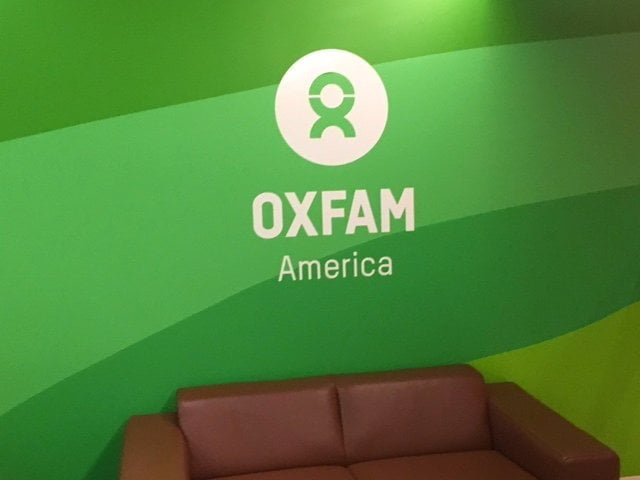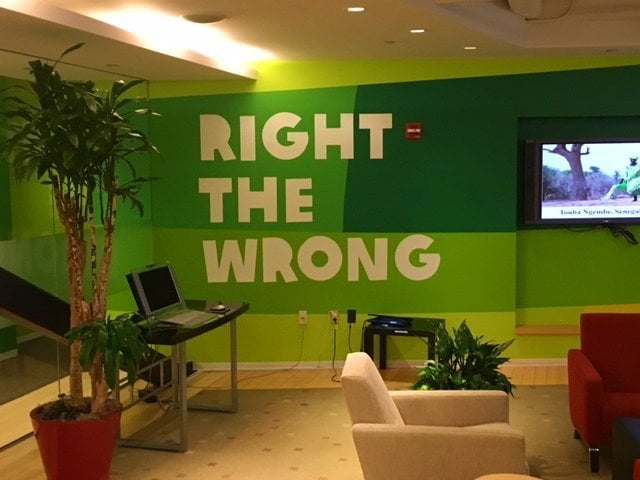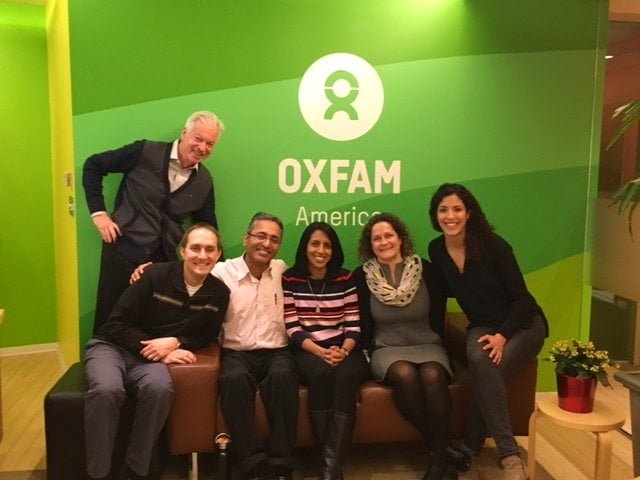Better Than Most is a regular feature of The Business of Giving examining the best places to work among social businesses and nonprofit organizations.
Denver: And we’re off to visit the offices of Oxfam which are located right next door to the TD Garden in Boston where both the Celtics and Bruins play their games. For those not familiar with Oxfam, it was founded in 1942 and it’s a global movement of people working together to end injustice and poverty. And as you’re about to hear, the people who work there find it to be a very special place indeed.

Andrea: If you’re creative and ambitious, you can do whatever you want here and try all kinds of different things here and still feel like you have a culture that supports you. I’ve had many managers over the years and the culture of Oxfam has been the same that you work hard, you do your job, you support your colleagues and you go home to your life. And at the same time, what we’re doing here is contributing, you feel everyday like you’re doing something that’s helping people.
Emily: I’m a boomerang Oxfam, Oxfam where I left and I came back, because it really is a unique place to work and it has a really welcoming environment that people here we work really closely together and because of that passion I think we feel really united and that there is a family aspect to it, we joke about calling at the Ox family. And there is that sense of unity here that I think doesn’t exist in other workplaces that we’re in it together, we’re fighting, sometimes really terrible issues, humanitarian crises, people who were literally on the edge of life and death and we’re in it together. And I think that is what’s really big about this workplace.
Oliver: One of the things that’s been consistent about my relationship with my managers is the freedom and the autonomy that they’ve given me to do my job and at the same time the support that they’ve given me. When I need help, when I need support, when I need assistance, struggling through a difficult problem or a difficult situation, they’re always there. But if that isn’t the situation, they back off and give me the freedom to go out and do my job and trust. They trust that I will go out and get my job done when it needs to be done and in the way that they expect it to be done. I’ve worked in a lot of organizations that have managers that tend to micromanage and I would be constantly reporting back about every single thing that I did, and that is not the case here.
Bridget: I never worked for an organization where I felt like all of me, my whole person was able to be expressed in the organization and I think that’s what’s unique about working in a social justice organization, I think it’s what’s unique about working in a human rights organization that is working in so many diverse places in the world is that I was able to come in to the organization with all the skills that I’d build in the private sector, all of my education. But actually I was able to bring into Oxfam my activism, which I’d never was able to express publicly in the private sector. I wasn’t able to even express really effectively publicly in some of the other nonprofits that I was involved in starting. And that is actually I think what makes from many of us, what makes it unique to work in a place like Oxfam is that I’m able to be–I’d like to say, I’m a Lesbian woman, I’m a Mother, I’m an Activist, I’m a Manager, I’m a person who’s deeply, deeply interested in culture and people all over the world and all of those things come together for me at Oxfam.
Vinod: So one of the things that I’m extremely grateful for in terms of Oxfam is that Oxfam–and this is something that I always reiterate to newcomers, you will always be given an opportunity. So for me Oxfam is always the land of opportunity, if you have enough agency, if you have an idea, if you seek to desire change and you are resilient, you will be given the chance.
 Oliver: One of the things that I really appreciate about Oxfam is the accessibility and transparency of our Board of Directors. I’ve worked for another organization that had a board that felt very remote and little bit scary to staff and really was disconnected from staff and that’s not the case here. It starts with the fact that there is a staff-elected member of the board which is rotated on a brand new basis every few years. So the voice of staff is brought into discussions among the board of directors and each time the board meets, our board chair comes in along with that staff member to talk to staff in a wide ranging and open conversation on any topic that anyone wants to raise for an hour or hour and a half without management and executive leadership present. And I really appreciate that and look forward to those sessions as a way not only to raise concerns that I see about what’s going on, but also to hear directly about what the boards working on, what their priorities are in any given time.
Oliver: One of the things that I really appreciate about Oxfam is the accessibility and transparency of our Board of Directors. I’ve worked for another organization that had a board that felt very remote and little bit scary to staff and really was disconnected from staff and that’s not the case here. It starts with the fact that there is a staff-elected member of the board which is rotated on a brand new basis every few years. So the voice of staff is brought into discussions among the board of directors and each time the board meets, our board chair comes in along with that staff member to talk to staff in a wide ranging and open conversation on any topic that anyone wants to raise for an hour or hour and a half without management and executive leadership present. And I really appreciate that and look forward to those sessions as a way not only to raise concerns that I see about what’s going on, but also to hear directly about what the boards working on, what their priorities are in any given time.
Emily: I think there is probably no one here who doesn’t feel empowered to share their opinion, which can sometime lead to very impassioned meetings, but I think I’ve never once felt like I need to hold back what I think about something, what I feel is the right thing to do or how we should approach something and I’ve never been reprimanded or made to feel like I shouldn’t give lend my voice to a topic. I think that is a big part of Oxfam program, but it’s a really big part of our culture here that everyone feels empowered to use their voice, whether that be in your one on one with you manager, in you team meetings or in a lunch meeting with the board member. People feel that they can raise their hand and ask a question and question authority empower, and I think that’s really powerful in it, it has helped democratize the organization.
Bridget: It’s a strange thing, we love each other. I don’t know, it’s like the weirdest thing. We actually love each other, does not mean we don’t have conflict, it does not mean that we don’t sometimes have issues that break down and there are issues that come up. But honestly we love each other and that’s why we say we come back to the organization, but in fact we never leave.
Vinod: How that manifest itself on a concrete basis is when we do an inclusion and diversity group, there is staff that actually took the lead to organize a group to talk about spiritual and religious values that are attractive to Oxfam, and I participated in one of the incredible conversation about people’s personal journeys and why they come to work here. It is just mind boggling, the wealth of experience we have and what makes people work here. I don’t want to get into people’s personal stories, but you have very, very moving and inspirational stuff, and you don’t get that and nobody told them to do it.
Andrea: I feel like I’ve always felt like it was a privilege to work at Oxfam, because we work on poverty, and poverty is a life long struggle, but people who come and go will work on here. But in this moment, I think people feel really privileged to come into this building and feel like they are doing something to make things better at a moment where a lot of people don’t know how to make things better. And I’m conscious of that and I think that that’s something that a lot of people feel right now in this moment.
Vinod: We have a mechanism called the spotlight of art word by anybody in the organization can say a public thank you to anybody else. So I have done it in the past, where I’ve asked people for favors or request and people have turned it around after office hours at the short deadline, because I needed to send something to the board, and I needed the backup information. So I will ride them, I will give them a spotlight of art and then that is publicly displayed in our lobby later, so that other people can come to know that people are going out of their way to help each other. And it doesn’t cause money, there is no money associated with it, but people do feel wonderful about the work they do, and it leaves you with a good feeling when you get a thanks back for saying “Hey! Thank you for that nice nod”.
Denver: I want to thank both Sarah Mandel and Alissa Rooney who helped to organize my visit and to those who participated: Andrea Ferrera, Emily Bhatti, Bridget Snell, Oliver Gottfried, and Vinod Parmeshwar. If you’re interested in hearing this again, reading the transcript or for pictures of the participants in the Oxfam offices, just go to denverfrederick.wordpress.com and it will all be waiting for you there.


